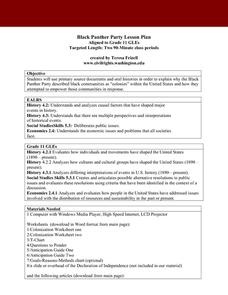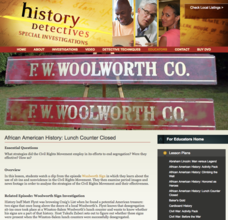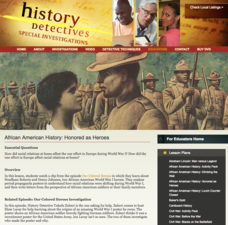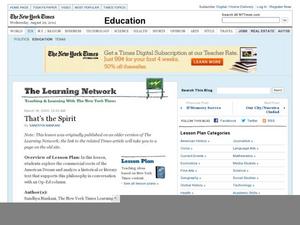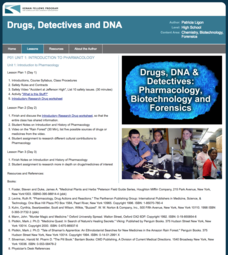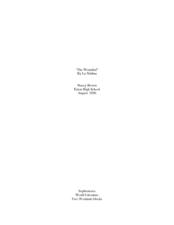Stanford University
Letter from Birmingham Jail: The Power of Nonviolent Direct Action
What strategies are most effective in changing an unjust law? Class members examine the tactics used in the Birmingham Campaign of 1963 (Project C) to achieve social justice and social transformation. After examining documents that...
University of Chicago
Using Artifacts for Clues About Identity
Learn about the ancient Near East through a close examination of ancient artifacts. Lead your class into analysis by first observing an artifact as a class. Pupils can then work in pairs to analyze the other artifacts and compile a list...
Curated OER
Black Panther Party Lesson Plan
Why did the Black Panther Party feel colonized, and what methods did they employ to achieve empowerment? Your class members will engage in an online PowerPoint presentation, analysis of several documents, and discussion in order to...
PBS
“He Named Me Malala”: Understanding Student Activism Through Film
Malala Yousafzai has become the face of social activism. After watching He Named Me Malala and short student-made films about what young people can do to become instruments of change, class members reflect on what it means to be an...
Curated OER
Role Models
First graders identify heroes by researching their family history. In this personal heritage lesson, 1st graders define the term "hero" and the characteristics that represent it. Students research family resources and family trees in...
NPR
Women in Early Film Lesson Plan
The role of women in the early film industry, both on screen and behind the scenes, is the focus of a resource that asks class members to analyze movie posters and DVD covers from the 1910s and 1920s. Using examples drawn from the...
PBS
African American History: Lunch Counter Closed
Young historians investigate and evaluate the effectiveness of the strategies the Civil Rights Movement used to end segregation in the United States. After watching an video interview with Carl Matthews and Bill Stevens who participated...
PBS
African American History: Honored as Heroes
To gain an understanding of the treatment of African American soldiers during World War I, class members watch an excerpt from the History Detectives film, Our Colored Heroes, and then examine three recruitment posters from that time...
C-SPAN
Choice Board - Conversations with Suffragists
Celebrate 100 years of women's suffrage by planning a re-enactment of famous women discussing their fight. After learners view a series of interviews with famous women played by actors, including Susan B. Anthony, Sojourner Truth, and...
Population Connection
Meeting Human Needs
How to meet the needs of people around the globe—a question many ask. The fifth in a six-part series about human population and its effects on the globe, the eye-opening lesson includes discussion, a homework activity, and an in-class...
Curated OER
That's the Spirit
Is, as Walt Whitman contends, America’s “almost maniacal appetite for wealth,” the heart of the American dream? Class members grapple with this question as they read David Brooks’ article “The Commercial Republic,” and quotes that...
NPR
Chinese American Women Lesson Plan
The National Women's History Museum provides a plan designed to accompany their online CyberExhibit, Chinese American Women; a History of Resilience and Resistance. After examining a series of primary and secondary source documents,...
American Evolution
Virginia Runaway Slave Ads
What does an ad reveal about a culture, or about the values of its intended audience? Class members examine a series of runaway slave ads—one of which was written by Thomas Jefferson—and consider what these primary source documents...
Kenan Fellows
Unit 1: Introduction to Pharmacology
Learn about the study of medications, including those found in nature and those made synthetically. The first of four lessons in a series on pharmacology includes lectures, hands-on experiments, research, and more.
National Endowment for the Humanities
George Washington: The Precedent President
Everyone knows that George Washington was the first president, but do your scholars know why that was so important? The lesson plan, the third in a sequence of three, allows learners to understand how George Washington set a precedent...
Edible Schoolyard
Pan de los Muertos
Accompany instruction and the celebration of El Dia de los Muertos with a loaf of Pan de los Muertos. Here, scholars measure ingredients precisely to create tasty bread, write a remembrance for someone who has passed away, and take part...
Theodore Roosevelt Association
Defining America's Role in the World
As the first American president to win the Nobel Peace Prize, and only one of four presidents to do so in United States history, Theodore Roosevelt's foreign policy achievements and preservation of peace are often overshadowed by his...
CHPCS
The United States in the 1920s: The New Negro Movement and the Harlem Renaissance
Music, writing, and activism all tell the story of history! The resource uses these elements and more in a presentation to discuss the Jazz Age and Harlem Renaissance. Your class views biographies, discusses important events, and...
Curated OER
World Literature: “The Wounded” By Lu Xinhua
“The Wounded,” the title story from a collection of stories about the Chinese Cultural Revolution (1977-78), is the central text in a World Literature unit examining choices. An anticipation guide, discussion topics, vocabulary list,...
Annenberg Foundation
Pre-Columbian America
What was life like in America before Christopher Columbus discovered the New World? Scholars investigate life in the Americas through the eyes of Native Americans in the first lesson of a 22-part series covering America's history. Using...
PBS
African American History: Climbing the Wall
Imagine the challenge of trying to trace your family genealogy if no records were kept of births and deaths. Where would you look for information? What types of documents could provide you with the information you seek? History...
Curated OER
Lesson: Urs Fischer: Reviving the Past Art Movements
Seven major abstract art movements are analyzed by learners in groups. Each group analyzes various works by determining which work belongs to which movement. They then read Flatland, engage in an art and literary analysis discussion,...
Museum of Tolerance
Just What Kind of American Are You?
Your parents were both in different countries. You were born in the US. Documents and application forms ask you to identify your racial or ethnic classification. Which box do you check? Class members collect documents and application...
Curated OER
Breaking the Chains, Rising Out of Circumstances
Discuss the history of slavery by analyzing historic photography depicting slavery. Learners write fictional stories based on these photographs. This is a creative and motivating way to launch a discussion of these topics.




